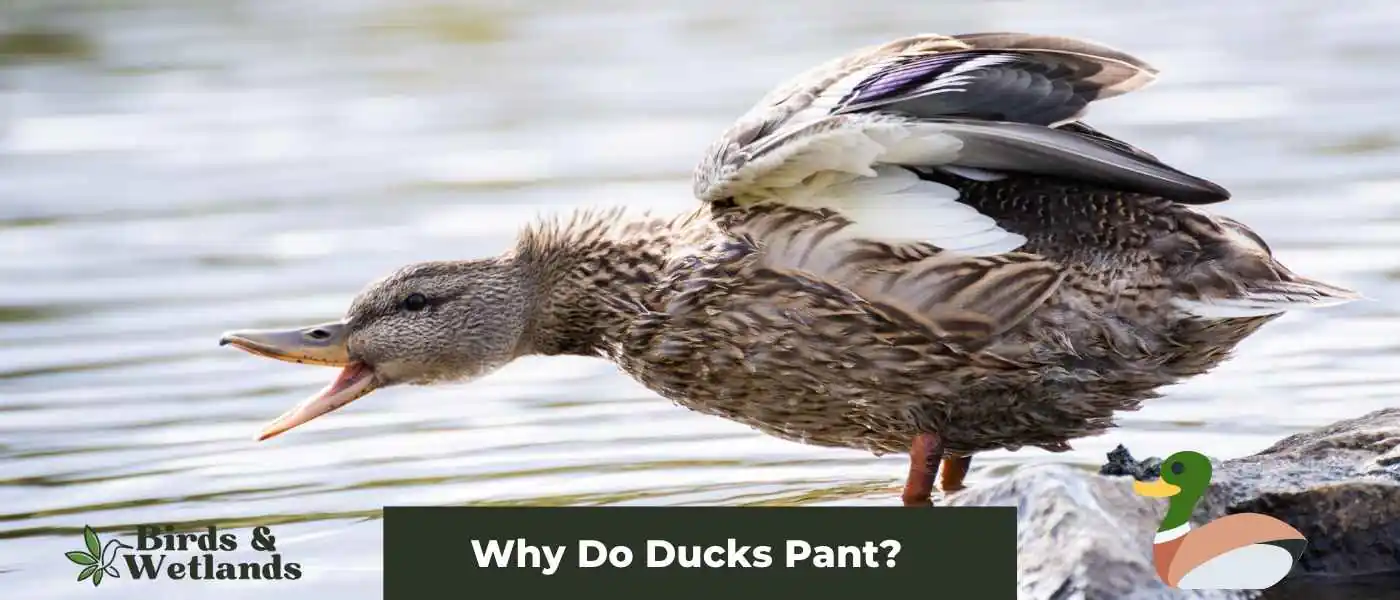Have you ever seen a duck panting and wondered what’s going on?
It might surprise you to learn that this is a common behavior among ducks!
Ducks may pant as a way to regulate their body temperature, similar to how dogs do. Since ducks don’t have sweat glands like humans, panting allows them to cool down through evaporative cooling from the surfaces of their lungs and airways. However, excessive panting could be a sign of stress, illness, or overheating, and may require attention.
Key Takeaways on Duck Panting
- Panting in ducks can be an indication of overheating, illness, or excessive stress.
- Ducks pant as a way to cool down since they do not have sweat glands.
- Other reasons for panting could include stuffy sinuses, overfeeding, choking, or stress.
- If you notice your duck panting, it’s important to spring into action right away. Let’s figure out what could be causing this and how to address it.
- Signs that a duck is too hot include excessive panting, constant wing flapping, standing in one place for extended periods, and abnormal behaviors.
- A duck breathing with its mouth open could be suffering from heat exhaustion or sickness.
- Preventing ducks from overheating involves a few key steps. Always make sure they have access to cool, fresh water. If the heat is too intense, consider moving them to a shaded area, like under a tree or inside a well-ventilated barn. In severe cases, don’t hesitate to gently apply ice packs to help them cool down.
Why Is Your Duck Breathing Heavy?
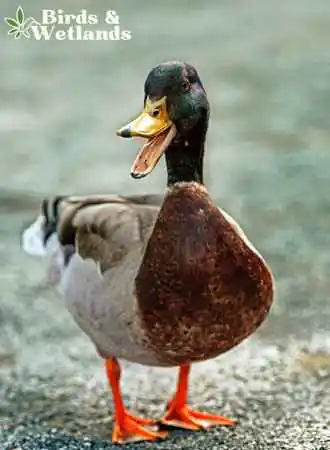
Reasons for Panting in Ducks and Remedies
Overheating
Move the duck to a cooler environment, provide access to cool water, use an ice pack if necessary.
Stuffy Sinuses
Vet consultation might be necessary to determine the proper treatment.
Stress
Identify and eliminate the source of stress.
Illness
Seek veterinary attention for diagnosis and treatment.
Overfeeding
Adjust feeding practices to ensure the duck isn’t eating too much
Choking
Ensure food items are appropriately sized to prevent choking.
The first reason ducks may be breathing heavily is that they are panting to reduce their body temperature. Many birds, including ducks, use hyperventilation to cool down, which means they take rapid, deep breaths to drive more air over their moist surface and lower their body temperature.
If your duck appears overheated or lethargic, you should check its temperature and, if necessary, provide it with a source of water.
The second possible cause of heavy breathing and abdominal heaving in a duck is a respiratory infection. Birds are especially vulnerable to respiratory infections because many airborne pathogens do not affect humans but can be fatal to birds.
Sneezing and coughing, labored breathing and discharge from the eyes and beak are all symptoms of a respiratory problem in your duck. In this case, taking your duck to a veterinarian is critical for proper medical care and treatment.
Overfeeding could also cause heavy breathing in ducks. Ducks are omnivorous animals that eat insects, plants, and other small invertebrates found in freshwater habitats like ponds or lakes.
If you take care of ducks and feed them regularly throughout the day and night, you may inadvertently encourage overeating habits. As a result, it is critical to ensure that your ducks are only fed healthy foods that correspond to their natural diet, as too much food can lead to obesity, increasing the risk of future health problems.
What To Do If Your Duck Is Panting?
When your ducks start panting, it is usually a stress mechanism or a sign that something is wrong. The first step in resolving this problem is to relocate your duck to a fresher, cooler location as soon as possible. You can use fans or cold water hoses to help cool them down even more and ensure they are in suitable recovery conditions.
If your duck’s panting does not improve despite these measures, it could signify a more serious health problem. In this case, you should seek the advice of a veterinarian to assess the situation and rule out any underlying causes of the panting. Heart problems or other medical conditions necessitating treatment or special care are potential issues.
To keep your ducks healthy and prevent this from happening again, feed them a well-balanced diet regularly and avoid overfeeding or stressing them out with too much food at once. Never force-feed ducks if they appear uneasy or unwilling to eat. Your ducks can thrive for years with proper care and attention!
The Mystery Behind Ducks Breathing With Their Mouths Open?
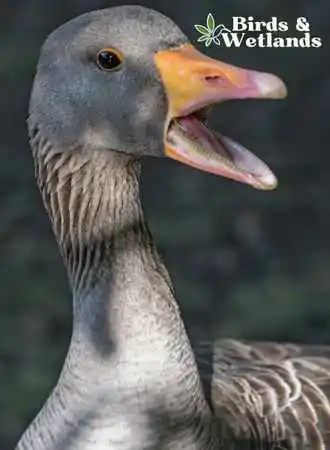
Ducks thrive in various environments, from arctic ice to steamy tropical wetlands.
One feature that contributes to their adaptability is how they regulate their body temperature. Ducks, unlike most animals, breathe with an open mouth. While this may make breathing more difficult, it actually serves an important function by allowing the duck to regulate its body temperature.
The process of evaporative cooling is quite fascinating. As the duck pants, moisture from its lungs and airways evaporates, drawing heat away from the body, much like how sweating works in humans. This is critical for ducks as they, unlike many other animals, lack sweat glands.
Ducks’ thick feathers can trap excess heat and create a dangerous thermal load on the body during hot weather or seasons. The duck allows cooler air to enter its system and helps carry away excess heat by opening its mouth while breathing.
Do Ducks Pant When Nervous?
It is still unclear what makes ducks nervous. But one of the possible signs of nervousness in ducks is panting or opening and closing their mouth repeatedly.
How Do You Tell if a Duck Is Stressed?
To determine whether a duck is stressed, look for indicators such as changes in behavior, physical symptoms, and activity levels. A duck may feel stressed if it is threatened by predators or other ducks.
Milder symptoms include increased irritability, pale skin, refusal to eat or drink, agitation, rocking back and forth on their perch, and keeping their feathers fluffed up.
Birds suffering from severe stress may exhibit more severe symptoms such as lethargy, weakness, sudden lameness (if they can walk), drooping wings or heads, loss of appetite, and weight loss.
If you notice any of these symptoms in your ducks or geese, you should get your flock immediate vet attention to determine the cause and appropriate treatment.
How Can You Tell if a Duck Is Too Hot?
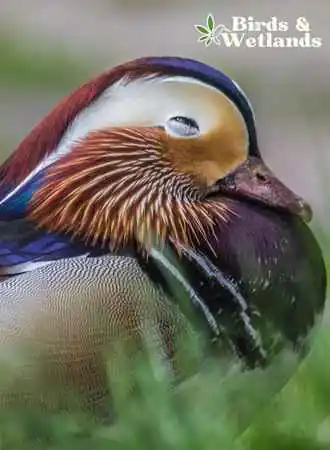
To keep your ducks healthy and safe from extreme heat, be aware of the warning signs that they may be overheating. Panting, a natural way for water birds to regulate their body temperature by cooling the air as they exhale is one key indicator.
Another early sign that your ducks need to cool off is if you notice them holding their wings away from their bodies or droopy wings.
You may also notice your ducks standing or sitting with their eyes closed as they seek shade from the sun or even lying on the ground without moving.
If you see a duck lying down and panting heavily, act quickly by providing your bird with a cool place immediately or cool water that ducks love.
Why Do Ducks Open and Close their Mouths Repeatedly?
Wild and domestic ducks are known for their odd and often perplexing behavioral patterns and normal routines, such as the repeated opening and closing of their mouths accompanied by tail pumping.
This bizarre behavior is a stress response, indicating that the duck is dehydrated, sick, has respiratory issues, or has a stuffy nose. Ducklings and adult ducks may also keep their mouths open to regulate their oxygen intake without inhaling too deeply into their lungs.
How to Prevent Ducks From Overheating
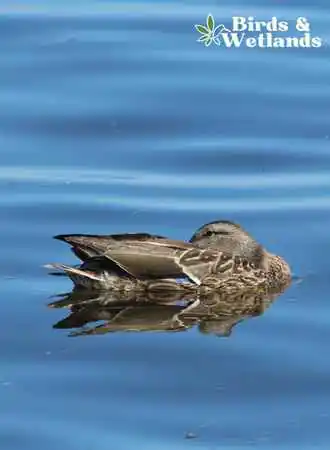
Due to the lack of sweat glands, ducks and other domestic birds such as chickens are particularly vulnerable to overheating due to excessive heat. According to Marcos H. Rostagano, a research animal scientist from the Livestock Behavior Research Unit, ducks have a higher average internal heat than other animals, making them susceptible to overheating quickly.
Overheating can affect ducks in many ways including their ability to lay eggs and may be potentially fatal to them.
Ducks require plenty of water to stay cool and avoid overheating. The best way to keep ducks cool in hot weather is to provide a constant supply of fresh water or sugar water. You can accomplish this by giving a swimming pond or kiddie pool or installing a sprinkler or water hose that allows the birds to bathe and play in moving water.
Providing plenty of shade and a cooler area with mulched hay is also important for keeping ducks cool. Whether it’s natural shade provided by trees and vegetation or artificial protection such as perches or external fans, ducks will be more comfortable in hot weather if they have access to shade at all times.
Increasing the number of nutrients in your ducks’ diet can also help prevent overheating. Certain minerals and vitamins can naturally boost metabolism and improve body temperature regulation. For example, adding vitamin C and calcium supplements to their feed can support healthy metabolism and reduce fatigue in hot weather.
Ensure that your ducks get enough exercise. Staying active promotes better overall health and keeps birds limber, allowing them to escape potential heatstroke triggers like draughts and sun exposure without becoming winded.
Checking your ducks regularly during hot weather will allow you to detect early signs before they escalate into more serious issues like heat exhaustion or heat stroke. Excessive panting, lethargy, tongue hanging out of the mouth, closed eyes with redness around them, weakness, or confusion are all early warning signs that it is time to seek additional care and management strategies before it is too late.
Best Overall Duck Feeder -FeatherEase Automatic Chicken Waterer & Feeder
Simplify Your Poultry Care with One Smart Solution!
Enhance your poultry care with the FeatherEase Automatic Chicken Waterer & Feeder, a convenient and efficient solution designed to keep your ducks and chickens well-fed and hydrated.

Pros
- Simplify your poultry care routine: Dual-function design combines an automatic waterer and feeder in one convenient unit.
- Save time and effort: Large feeder and waterer capacities reduce the need for frequent refill.
- Save money: Innovative no-waste feeding system minimizes feed spillage and waste.
- Long lasting: Food-grade, BPA-free materials ensure the safety and health of your poultry, while the durable constructio.
- Easy-to-assemble and maintain design simplifies the process of keeping your poultry hydrated and well-fed.
Cons
- Users with hard water may experience difficulty in separating the inner cup from the main cup of the waterer due to mineral buildup.
- The feeder’s holes may be too large for some users, allowing chickens to scatter food out, which could result in waste.
- The waterer may not function effectively in colder climates, requiring alternative solutions during the winter months.

